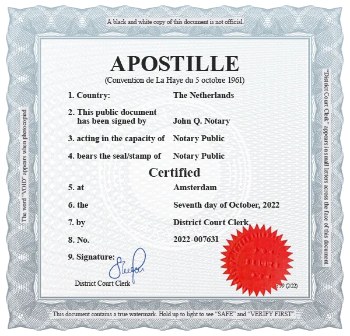Apostille for International Document Authentication
Understanding Apostille
Apostille is a certification that verifies the authenticity of a document for use in foreign countries that are part of the Hague Apostille Convention.
This streamlined process simplifies the legalization of documents, ensuring their validity internationally.
When is Apostille Required?
Apostille becomes necessary when presenting documents abroad for various purposes, such as legal proceedings, business transactions, or educational pursuits. Whether it’s a birth certificate for immigration or a business contract for international trade,
Apostille ensures the document’s acceptance in another country.
Documents Eligible for Apostille
Not all documents are eligible for Apostille.
Generally, vital records like birth certificates, marriage licenses, adoption papers, educational diplomas, and certain legal documents qualify for Apostille. These documents must originate from a country member of the Hague Apostille Convention.
Apostille vs. Legalization
Obtaining an Apostille follows a structured procedure.
First, ensure the document is correctly prepared and meets all requirements.
Then, submit the document to the appropriate authority, typically the Secretary of State or equivalent, for authentication.
Once authenticated, the Apostille is affixed to the document, certifying its validity for international use.
The Apostille Process
Apostille and traditional legalization methods serve similar purposes but differ in their application.
While Apostille simplifies the process for countries under the Hague Apostille Convention, legalization involves multiple steps, including authentication by various authorities.
Understanding these distinctions helps navigate the document legalization process effectively.
Common Challenges and Solutions
Obtaining an Apostille can encounter challenges such as document errors, language barriers, or bureaucratic delays despite its straightforward nature.
However, proactive measures like double-checking documents, seeking translation services, and maintaining open communication with authorities can mitigate these obstacles.
Costs Involved in Apostille
Budgeting for Apostille involves considering government fees, service charges, and additional expenses like shipping or courier services. While costs may vary depending on the document type and jurisdiction, allocating sufficient funds ensures a smooth Apostille process without financial setbacks.
Tips for a Smooth Apostille Process
Preparation is critical to streamlining the Apostille process.
Organize documents meticulously, research the requirements thoroughly, and communicate effectively with authorities or service providers. By following these tips, individuals and businesses can navigate the Apostille process efficiently.
Legal proceedings
Apostille serves as a crucial tool in facilitating international transactions and legal proceedings.
Understanding its purpose, process, and requirements is essential for cross-border documents.
Accredited Apostille Service. No Personal Visit Required.
FAQs About Apostille
What is the Hague Apostille Convention?
The Hague Apostille Convention is an international treaty that simplifies the process of authenticating documents for international use among member countries.
How long does it take to obtain an Apostille?
The processing time for Apostille varies depending on the jurisdiction and document type. Typically, it can take anywhere from a few days to several weeks.
Can any document be Apostilled?
No, only documents from countries participating in the Hague Apostille Convention are eligible for Apostille.
Do I need to translate my documents for Apostille?
If the document is in a language other than the official language of the issuing country or the destination country, it may require translation.
Can Apostille be used in non-member countries?
Apostille is only valid among countries in the Hague Apostille Convention.
Traditional legalization methods may be necessary for non-member countries.




